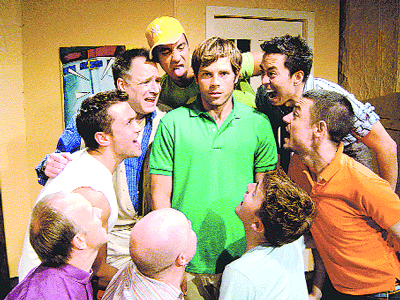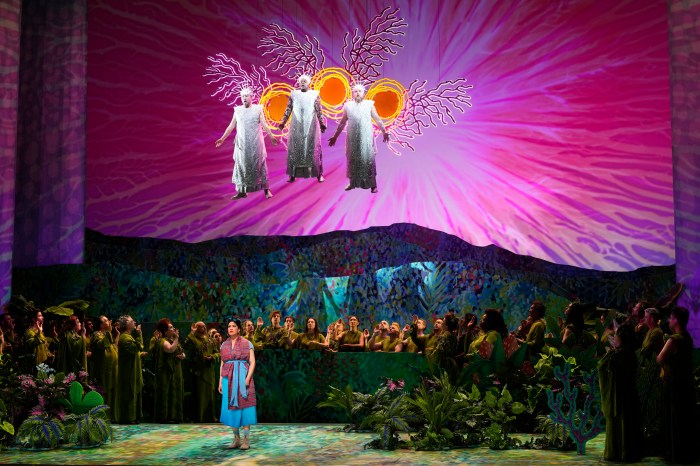Wilde and Shakespeare in Off-Broadway deliveries, fluffy and earnest
Don’t go to see “The ‘All Male’ Importance of Being Earnest” with high expectations, and you’ll have a great time. It’s a campy re-telling of the classic Oscar Wilde play set in New York and the Hamptons that is a campy romp with an attractive cast who throw themselves into the silliness required by the occasion. The show began at the Fringe Festival in 1998 and has been flitting around the city in occasional revivals since then. It is now playing in a limited engagement at the Sanford Meisner Theatre where it is selling out.
Hugh Hysell has adapted and directed the play to be exactly the kind of superficial gay theater that is so sharply satirized in “The Gay Naked Play,” which is about to reopen at EAT and is really not to be missed. While Hysell’s adaptation is full of hysteria and high jinks, on many levels he seems to have missed the point. By taking the sexuality that is implicit in Wilde’s language and making it explicit, he undermines the tension of the original and what would be naughty becomes vulgar.
The quintessential comedy of manners has become a morass of mannerisms and after the initial fun of the concept, it soon wears thin. It seems the only way to make the lines work in this concept is to turn everyone into a flamboyant and nelly queen. Fortunately, Hysell has cut the play down to a bare 90 minutes and focused on the barbs we all remember, and can quote at cocktail parties, so it’s not so bad.
The cast is for the most part very good and carry off the show with abandon. It is largely their charm that supplies the fun of the evening when the concept starts to falter. Jerry Marsini as Jack actually manages a few honest moments, which grounds the more over-the-top elements of his performance. Joe LaRue as Algernon is quite funny as well. Adam Beckworth has the makings of a real comic actor—a master of the slow burn particularly in the famous tea party scene where tea has been replaced with cosmopolitans. John Kudan has the voice and the stature of a traditional Lady Bracknell, but he has been directed in a way that makes him more a ridiculous figure than a wealthy and egocentric tartar.
It’s all in good fun and pleasant enough, but hopefully you’ll forgive the more curmudgeonly among us if there isn’t just a touch of regret that this couldn’t have been something more. Wilde was satirizing class distinctions, social prejudices and the role money plays in defining personal value. The various pettiness and narrow mindedness and thoughtless acquiescence to relatively arbitrary standards is ripe for skewering in contemporary society. One wonders how a serious production with men taking all the roles yet dressed as women would better balance the richness of Wilde’s observations with his comedy.
That, however, is not what Hysell and company are after here. They promise—and deliver—a romp. Perhaps the company will next tackle something a little more substantive.
There was, however briefly, something a good deal more substantive and thrilling at the Blue Heron. Susannah York in her one-woman show lit up the small theater with a wonderful evening that was so moving it was marvelous in its own right and felt like the perfect antidote to the stultifying, mechanical and altogether tedious “Dracula” now on Broadway. York proves once again that one person and beautiful words have a theatrical power that is not just technically dazzling but deeply moving.
She assembled 17 pieces, plus two epilogues as an encore, which talk about women and love in Shakespeare. She tackles youthful romance, steely ambition and mature grief, moving from one to the next with great facility. Starting with Juliet’s “Gallop apace” from “Romeo and Juliet” and ending with Constance’s mourning of her son’s murder—one of Shakespeare’s great showcases for women—from “King John,” York’s performances grew more mature and deeper with each speech. The evening York assembled was, perhaps, the “Ages of Woman” that Shakespeare never wrote, and while some of these speeches are definitely of the “greatest hits” variety; she was equally compelling as a 14-year-old bride as she was as the murderous Lady Macbeth.
Interspersed between the speeches were observations on her life, career and acting that show York as a warm and committed individual. Indeed, while one might quibble with some of her character choices, there is no doubt that this is an actress of extraordinary commitment and unassailable mastery of her craft. York found the truth in each of these women and took the audience on a wonderful journey. It is the person and not the machine that thrills, and it makes one wonder when Broadway producers will trust this human power and rely on that more than on the wicked winches that can kill the soul of theater.
We also publish:
ADVERTISING



































